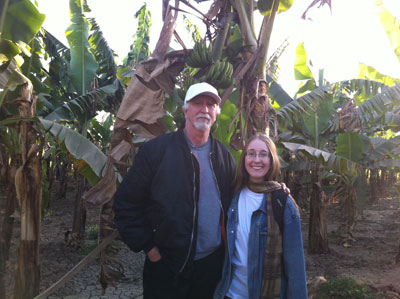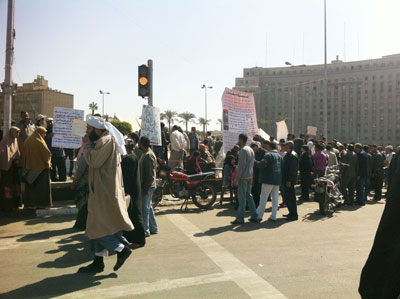Traveling in Egypt during a revolution
At the end of January 2011, my daughter, LeAnn, 22, and I finalized our plans to visit Egypt. Our trip was not meant to be a traditional vacation but one arranged as we went along our way, using local guides and taking public transportation. We wanted to see the same Cairo that 18 million residents live and work in every day.
However, only days after we booked our airline tickets for this 10-day journey, Cairo was ablaze in protest over the policies of the government of President Hosni Mubarak. We postponed our trip and departed for Cairo on Feb. 28. The adventure we sought proved to be much more than what we had bargained for.
Downtown Cairo — the “real” Cairo, not the Cairo with the new, sparkling-clean hotels and upscale neighborhoods — had changed some since I was last there 12 years before. Yes, the Internet is now available to most, but I found the city to be dirtier, more gritty, with buildings left unkempt and trash and debris piled everywhere. In addition, the recent political protests had contributed burned-out government buildings and other structures across the landscape.
Although we were entering a country clearly in crisis, we were not unprepared for what greeted us. During the protests in Tahrir Square in early February, the government declared certain foreigners to be social agitators, resulting in journalists and others being beaten and ridiculed. For that reason alone, we chose not to stay at a hotel upon our arrival in Cairo. Instead, we booked a room at a hostel, one normally associated with seasoned travelers and wayward youth.
Prior to leaving the States, we contacted Hostels.com and chose a room at the King Tut Hostel (37 Taalat Harb St.; phone 002 02 23917897). Located on the eighth floor of the Indian Embassy Building, the structure is old and worn, with a rickety elevator (when it worked) and a nondescript storefront. Across the street was a McDonald’s restaurant.
Our large, private room had air-conditioning, a bathroom and shower, two single beds, satellite television, free WiFi and a balcony. A family-owned facility, it was clean and secure, and at $11 a night per person, with breakfast, a true bargain. A very helpful staff also offered free airport transfers.
At the time of our original booking, we also were aware that all the banks had been closed, many hotels were empty or closed and almost all of the tour companies doing business in Egypt had put most of their tours on hiatus until the fall. Such is the effect of a social revolution.
But Ahmed, the general manger of the hostel, managed to arrange for privately escorted tours using cars with tinted windows and no indicia.
Moving about during a civil uprising, we tried to be as anonymous as possible, and that meant dressing conservatively in order to not draw attention to ourselves, attempting to visit archaeological sites early in the morning when there were fewer people out and about, trying not to linger in one setting too long and never going out after dark. In Cairo, in particular, most of the protesting, violence and rioting occurred after 6 p.m.
Many eateries offered deliveries to the hostel. We had the hostel staff order for us and also bring to our room what was delivered. In that way, we would have little or no contact with those who might think wrongly of us.
I am used to traveling with a minimum of cash and relying on a credit card to pay for most items. By the time we arrived in Egypt the banks had reopened, but many merchants were refusing to accept anything other than Egyptian pounds, and only a few were accepting credit cards.
Merchants were not trusting that their own banks would credit them for these credit card charges, and many believed the banks would not exchange foreign currency. So bringing along extra cash — in the local currency — would have solved many problems.
For example, after a day of stealth sightseeing, I left the hostel about 30 minutes prior to dark, hoping to grab a burger at a restaurant nearby. Unfortunately, all they would accept was Egyptian pounds, and I had none.
I searched for a currency-exchange booth, finding one about 30 minutes later. I ran back and placed my order, but as I stepped outside with the food, I walked right into the middle of a protest by several hundred angry young men.
Like so many others, I simply stood to the side and took it all in, sinking into the darkness of the alley and trying not to be a foreigner. At that moment, I realized you should never wander alone in a city going through a revolution. To do so puts you at risk of suddenly disappearing, leaving your travel partner feeling lost, desperate and wondering what to do next.
During our trip, sometimes it was best not to be totally honest about who we were and from where we hailed. At first, when asked our nationality, we truthfully noted we were Americans. Such an admission often brought scowls and seeming resentment on the faces of our questioners. Later we just answered that we were Canadians, a fib that would result in no response, just blank stares. Apparently, our Canadian friends offend no one.
Surprisingly, the state of security in Egypt, specifically at tourist sites and at hotels, was incredibly lax. On most occasions, if we set off the metal detector alarm, we would be waved on by the police. Later, we learned to simply walk around the metal detectors so as not to set off the alarms, and we were neither stopped nor questioned.
Under Ahmed’s guidance and planning, LeAnn and I managed to travel almost undetected via private car all around Cairo and to Alexandria and back.
On one such day, we were caught in a traffic jam in Tahrir Square but again managed to escape without detection, as our driver/guide skillfully steered us back to safety. Having a plan and a professional driver/guide made all the difference.
Ahmed also arranged for our safe passage to Aswan and Luxor, again using private driver/guides, who often acted as interpreters and go-betweens with local merchants and the population in general. But as we got farther and farther away from Cairo and the protests, such intervention became less necessary.
Not once during our journey did we ever encounter another American, and only rarely did we meet another traveler.
In terms of cost, for about $800 for both of us, Ahmed arranged for all travel with private cars and guides throughout Cairo and Alexandria as well as our entire excursion into Upper Egypt and all lodging outside of Cairo. Meals and archaeological site entrance fees were our only extra costs.
LARRY THOMAS WARD
Tucson, AZ


